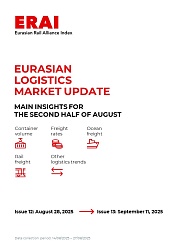Belgrade-Budapest high-speed train moves forward with Chinese loan
At first glance, all may seem good in the brave new world about this railway project, which appears to make political — bringing two nations with strong ties closer together, while making Serbia all the more central to EU trade routes and Hungary a key player in the Western Balkans — and economic sense, halving the travel time between the two countries’ capital cities from 8 to less than 4 hours.
But after securing the undisclosed loan from China, which should fund up to 85% of the project, the Hungarian government moved to declare all the documents linked to the scheme as state secrets for ten years. That’s when the feeling of unease starts to kick in.
The much-awaited high-speed Budapest-Belgrade railway is anything but innocent. The single most expensive rail investment ever in Hungary, it should cost at least $2.1 billion according to the most conservative — and optimistic — estimates.
«If you take a look from a broader perspective, it absolutely makes sense to develop the North-South transportation and communication lines in the region», commented Budapest-based senior analyst Peter Goreczky to Euractiv.
The high-speed train between Belgrade and Budapest should transport Chinese goods arriving at the Greek port of Piraeus.
A long-running saga
The plans to develop a high-speed railway between Belgrade and Budapest first came to light in 2013, and its long-running saga has become, over the years, a symbol of China’s failed investment promises in Central and Eastern Europe, as well as a major sticking point for Hungary’s allies. A Memorandum of Understanding (MoU) was signed between the three countries the following year.
The details were settled in 2015 and envisioned to build a total of 350 km of railway, including nearly half on EU territory, to make the Budapest-Belgrade route a key link in China’s Belt and Road Initiative and infrastructure networks spanning all over the European-Asian continent. Mainly intended for cargo transportation, the line would be used to transport goods arriving at the Chinese-owned Greek port of Piraeus, in Athens.
The first serious doubts materialized in 2016, when the EU launched an infringement procedure against Hungary, urging Budapest to be more transparent in the public tender for the railway contract. Unsurprisingly, the bid was eventually secured by billionaire tycoon Lorinc Meszaros, a long-time friend and ally of Orban. Serbia, for its part, only started construction on its territory in 2017.
Budapest-Belgrade high-speed train: who will foot the bill?
Underneath the political rhetoric, whether in Beijing which presents the new railway as a crucial link in China’s global BRI infrastructure project to bring Asia and Europe closer than ever, or in Budapest, where politicians have been patting themselves on the back for making Hungary a central player in trade between the EU and south-east Europe, worries surrounding the multi-billion project have been growing.
Sceptical analysts pointed out that the Budapest-Belgrade route was, simply put, an unprofitable project that only served those three countries’ individual political interests in the short-term. More importantly, it might also plunge Hungary into a debt-trap: while well-connected tycoons might benefit from the contract, Hungarian taxpayers are the ones that could foot the massive bill in the long-run.
The government brushed off any type of criticism and concern, with Fidesz member Gabor Banyai saying that «Hungary would still be in the Middle Ages if all infrastructure investments had been decided on whether or not they pay off».
«For the Hungarian government, there are evidently political motivations in the background», Peter Balazs, head of the Centre of Neighbourhood Studies at CEU and former Hungarian EU Commissioner, said to BIRN. «The Budapest-Belgrade railway is just another opportunity for Orban to annoy the West and prove that he can have allies and partners outside the EU [...] But in this case, I’m afraid the government wants to conceal something».
The fear of China’s influence
From a geopolitical point of view, critics fear China, which has made this project its flagship initiative in Europe to promote its «New Silk Roads», may use, as it has in other countries, its financial leverage and economic clout to strengthen its political influence.
Gradually launched since Xi Jinping’s rise to power, the Belt and Road Initiative, or New Silk Roads, aims to establish terrestrial and maritime links between China, Central Asia and Europe to consolidate Beijing’s control over the global economy, trade flux and supply chains.
One of Xi’s top priorities, this much-debated «new silk road» involves trillions of dollars in investment over the next years and decades and has divided EU member states. While some, like French President Emmanuel Macron, have urged to end Europe’s «naiveté» and disillusions towards China, others have been advocating closer ties with the world’s second-largest economy and see the new Silk Roads as a golden opportunity to do so.
Beijing has, in this context, been keen to foster closer ties with Central and Eastern European countries for whom, not only developing ties with China makes absolute sense for their export-oriented economies, but also sends a strong political message to Brussels, all the while securing massive bulks in funding without the usual EU strings attached. Hungary’s Orban is a text-book example of this, but isn’t the only one.
Concerns surrounding the endgame of the Budapest-Belgrade route only increased when taking into account Beijing’s ideological approach in its global BRI endeavor. Made evident by the notorious «document 9» secret memo from the Chinese Communist Party leaked in 2013 — where constitutional democracy, universal human rights or freedom of the press were seen as mere «Western notions» that ought to be fought against and contained — China could be using its economic power to lay the groundwork for an ideological battleground.
«While China will be pleased to inaugurate the Budapest-Belgrade railway, that moment will have come a little too late», wrote The Diplomat’s Andreea Brinza. «And nobody knows how many more years it will take until it will be extended to Piraeus, as was the original intention».
Despite all the delays and hurdles, obscure investments of this magnitude in self-professed «illiberal democracies» such as Hungary or Poland could open the door to China’s political influence in these countries and further drive the EU’s «East» and «West» apart. Under these circumstances, and considering that Central European countries’ illiberal turn is, at least partially, a symptom of fears Western Europe has failed to comprehend and address to this day, no doubt would the EU become even more divided than it is today, and European construction suffer yet another blow.
This could leave the door wide open to China who, on the other hand, will be ready to «pay attention» to CEE countries’ woes. And shower them with cash. Bulks of it.





